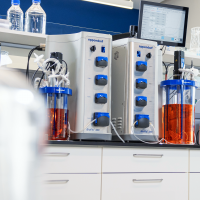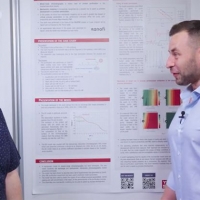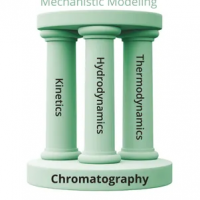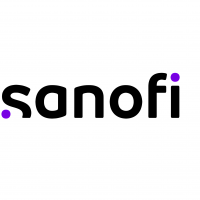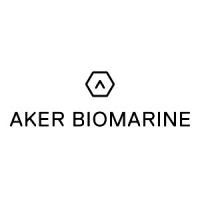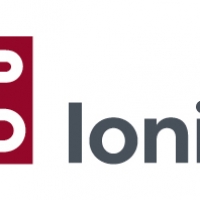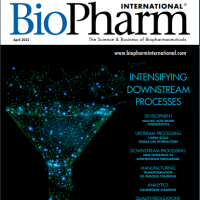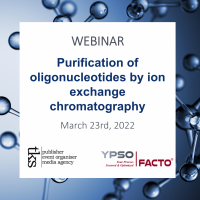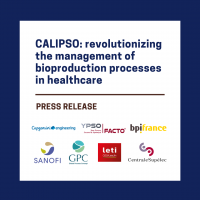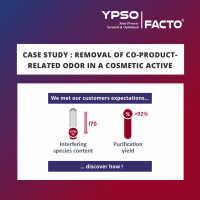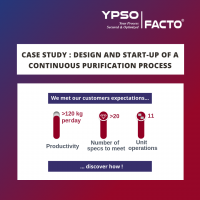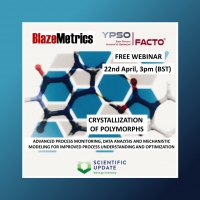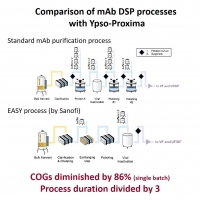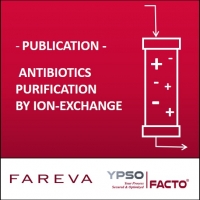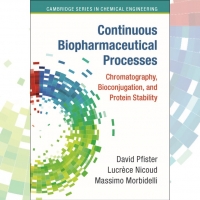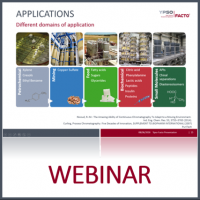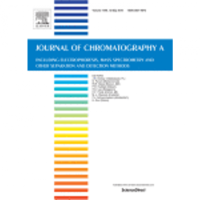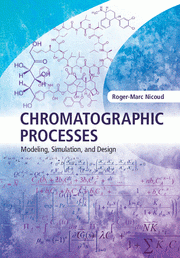Contact us for a demo Follow us:
Knowledge Center
Results found for your search on the term "Downstream"
Filter by Keywords
Product
Small molecules - Neutraceuticals - Antibodies - Antibiotics - Cosmetics - Enzymes - Oligonucleotides - Peptides - ProteinsPublications
Purification of a Viral Protein by Ion-Exchange Chromatography: Methodology for Mechanistic Modeling and Comparison with a Statistical Approach
Publication in BioProcess International
We developed a mechanistic model to simulate purification of a viral-protein complex by cation-exchange chromatography on the “wrong side” of the molecule’s isoelectric point (in a pH range where the protein is mostly negatively...
Read More
Blog
Interview with BioProcess Insider – Modeling to Accelerate Downstream Development
Following Ypso-Facto’s Best Poster Award at BioProcess International Europe, our Co-CEO Edouard Nicoud spoke with BioProcess Insider editor Joshua Abbott about how mechanistic modeling can accelerate downstream process development — with a...
Read More
Publications
Oligonucleotide Purification by Ion-Exchange Chromatography: Predicting the Impact of Salt Type and Buffer pH with Mechanistic Modeling
Published in BioProcess International in collaboration with Roche
Check out Ypso-Facto's new publication on oligonuclotide purification by Ion Exchange Chromatography in collaboration with Roche.
ABSTRACT
Ion-exchange chromatography (IEC) is a common method for oligonucleotide purification (1, 2)....
Read More
Blog
Sanofi's experience with mechanistic modeling and Ypso-Ionic
Mechanistic models offer a robust alternative to traditional statistical methods because they require fewer experimental data and provide superior predictive capabilities, even outside of the conditions studied experimentally.
We have implemented...
Read More
Publications
Bioprocess Simulation: Why the Industry Needs To Embrace Engineering Rather Than Empirical Approaches?
By Roger-Marc Nicoud in Bioprocess International
In 1903, the Wright brothers built the first functioning airplane, and botanist Mikhail Tsvet became the first scientist to use chromatography to separate components of a solution (carotene pigments, in his case).
Now, 120 years later, new...
Read More
Blog
Mechanistic modeling can help switch from batch to continuous: Myth or Fact?
Fact
Once model parameters have been determined with a single column system, they can be used to perform simulations of multicolumn chromatography (MCC) with any number of columns.
Calculating key performance indicators (KPIs) for both single and...
Read More
Blog
Mechanistic modeling can help secure scale-up: Myth or Fact?
Fact
Unlike statistical models which are based on correlations and are only valid for their calibration data set, mechanistic model parameters have an actual physical meaning and can be applied to different process setups and process scales.
This...
Read More
Blog
Reduced experimental work by 4 compared to DoE for an oligonucleotide ion exchange process
Customer Success Story from GSK
"GSK Engaged Ypso-Facto’s expertise, their Ypso-Ionic software and GPX approach to develop a mechanistic model of a complex ion-exchange purification process.
Compared with the classical statistical DoE approach, only 25% of the experimental...
Read More
Blog
3 Benefits of Mechanistic Modeling For Chromatographic Process Development
Mechanistic modeling is based on the laws of physics and biochemical principles to predict system behavior. It is the most advanced way to speed up chromatography process development, scale-up, and troubleshooting.
Watch the Youtube video to...
Read More
Blog
Doubled productivity of a multi-column ion exchange chromatographic process with increased purity
Customer Success Story from Aker BioMarine
About the optimization of a multi-column Ion Exchange system:
« In combination with AKBM “user-knowledge” and intuition, Ypso-Facto used experimental laboratory- and production-data and made simulation-models with the software...
Read More
Blog
Three Benefits of Mechanistic Modeling For Chromatographic Process Development
Optimizing chromatographic processes can be achieved by employing mechanistic modeling, with the following benefits:
Increase Process Understanding
Get to the core of chromatography with mechanistic modeling. The combination of well...
Read More
Publications
Purification of Protein by HIC
Mechanistic Modeling for Improving Process Optimization
In collaboration with GSK, this article outlines how a simple chromatographic model can predict the impact of pH and ionic strength on HIC chromatograms.
Hydrophobic interaction chromatography (HIC) is a separation technique widely used for the...
Read More
Blog
Discover Ypso-Ionic® in 3 minutes!
Open-up a new world of opportunities for your chromatographic processes
Working in downstream process development, do you:
interact with people of different skills and expectations?
need to share information in a standardized and non ambiguous manner?
want to increase teamwork efficiency?
If yes, take a look...
Read More
Blog
Interviewing experts on DSP intensification
Process intensification allows biomanufacturers to produce more product, often more quickly, using fewer raw materials and smaller equipment in less space. While there has been much focus on upstream process intensification, this approach can have...
Read More
Blog
Article : Intensifying Downstream Processes
Cynthia A. Challener - BioPharm International, April 2022 Issue
The need to increase efficiency and productivity is driving adoption.
The biopharmaceutical industry is faced with the challenge of increasing efficiency and productivity to get needed medicines to patients more quickly and cost-effectively....
Read More
Webinars
Getting your process up to speed with digital tools; purification of oligonucleotides by ion exchange chromatography
Presented by Kilian Kobl and illustrated with real-world examples from AstraZeneca and GSK
Oligonucleotides have emerged as a promising class of pharmaceuticals, leading to a drastically increasing demand. Like peptides, they are typically produced by solid phase synthesis and then purified by reverse-phase chromatography and increasingly...
Read More
Blog
How to prepare your buffers in two clicks ?
Ypso-Ionic, the software solution for designing chromatographic processes
Did you know that ...
In addition to maximizes the value of experimental data and makes predictive simulation a game changer, Ypso-Ionic software can help you prepare your buffers in two clicks !
Select your raw...
Read More
Blog
Maximize the value of your data and embrace the power of mechanistic simulation
Tired of working with Excel spreadsheets? With multiple and complex software tools limiting your efficiency? What if you could have a single solution to capture your data and run predictive simulation?
We have good news for you: Ypso-Ionic, the...
Read More
Blog
Does pH matter in your separation process?
Do you work with mineral ions?
With organic buffers?
With proteins, peptides, or oligonucleotides whose retention behaviour is dramatically impacted by their charge?
Ypso-Ionic® is a software solution for designing chromatographic...
Read More
Publications
CALIPSO: revolutionizing the management of bioproduction processes in healthcare
Paris (France) – September 16th, 2021 – Sanofi, Capgemini, Ypso-Facto, GPC Bio, CEA, CentralSupelec announce the launch of the project CALIPSO !
A structuring R&D project for French medical research, financed and coordinated by a consortium of high-profile industrial and public actors.
An essential mobilisation to accelerate access to new treatments at an acceptable cost, to ensure...
Read More
Case studies & Application Notes
Case Study: Removal of an odorous molecule in a cosmetic product
Process simulations using mechanistic modeling
Challenge
Cosmetic active ingredient manufacturing process
More stringent specifications in terms of the residual concentration of an odorous co-product
Methods
Identification of relevant technologies for the removal of the odorous...
Read More
Case studies & Application Notes
Case Study: Design and start-up of a continuous purification process
Challenge
Existing pilot batch process for the purification of omega-3 fatty acids from natural oil (11 unit operations)
Shift to an industrial continuous production
Methods
Analysis of the existing batch system and...
Read More
Webinars
Crystallization of polymorphs: advanced process monitoring, data analysis and mechanistic modeling for improved process understanding and optimization
Presented by Lucrèce Nicoud from Ypso-Facto and Richard Becker and Joe Oliva from Blaze Metrics
Many active pharmaceutical ingredients are known to crystallize in different polymorphic forms; a phenomenon that greatly impacts solubility, bioavailability, color, shape, filterability and tabletability. It is key to produce the targeted polymorph...
Read More
Publications
Process comparison in Ypso-Proxima: EASY by Sanofi vs. classical mAb purification process
Technical and economic evaluation to reduce Cost of Goods
During the last years, alternatives to Protein A purification in mAb downstream processing have raised substantial interest. In parallel, the pharmaceutical industry has a growing need for reliable tools supporting process development and rational...
Read More
Blog
NEW ARTICLE – Fareva and Ypso-Facto investigate the purification of an antibiotic by ion-exchange
Using Mechanistic Modeling for Understanding Antibiotics Purification with Ion Exchange Chromatography
This article is based on a real industrial purification process by Fareva and highlights the power of mechanistic modeling for process development:
Our client needed to change a raw material to secure his supply chain. From a process point of view,...
Read More
Publications
Continuous Biopharmaceutical Processes
Chromatography, Bioconjugation, and Protein Stability
ABSTRACT:
This innovative reference provides a coherent and critical view on the potential benefits of a transition from batch to continuous processes in the biopharmaceutical industry, with the main focus on chromatography. It also covers the key...
Read More
Publications
Designing Robust Chromatographic Processes with a Proven Predictive Approach
Webinar by David Pfister
Preparative chromatography is a versatile purification technique used in various industrial sectors including petrochemistry, sugar production, pharmaceutical and fine chemistry, to name only a few. While this technology is often considered complex,...
Read More
Publications
A continuum theory for multicomponent chromatography modeling
ABSTRACT:
A continuum theory is proposed for modeling multicomponent chromatographic systems under linear conditions. The model is based on the description of complex mixtures, possibly involving tens or hundreds of solutes, by a continuum. The...
Read More
Publications
Chromatographic Processes
Modeling, Simulation, and Design
ABSTRACT:
Addressing all aspects of the design, modeling and simulation of chromatographic processes, this result-oriented primer provides a practical guide to all the necessary approaches, methodologies and tools. Beginning with key definitions...
Read More

Ypso-Facto is a service company helping industrial firms to develop, optimize and secure their chemical processes and bioprocesses.
© Ypso-Facto 2014 - Powered by Ealys | Legal Information

